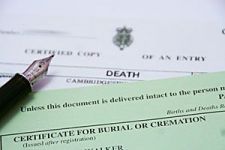
Register a Death
When should you register?

By law, all deaths in England and Wales must normally be registered within five days of the death occurring.
In practice however the death should be registered prior to the funeral, and cremation is not allowed to proceed until the death is registered.
Who can register a death?
The duty to provide the information to the Registrar lies with a relative of the deceased.
Should a relative be unavailable, other persons can give the information, in which case we will be pleased to advise please contact us.
Where should you register?
In England and Wales deaths are normally registered at the Registrar's office for the District in which death occurred.
However a death occurring in Essex may now be registered at any Registrar's office within the county. The same applies in Hertfordshire but not in London boroughs.
For more details please contact us.
Many Registrar offices have an appointments system so you should call them first to check.
What information does the Registrar require?
The Registrar will ask you for the following information:- The full names and address of the deceased, occupation, date and place of birth
- Name of widow or widower or, if married more than once, the names of former wives or husbands
- The date of birth of a surviving spouse will also be required
- The deceased's father's full name and occupation, their mother's full name and maiden surname
- The name and address of the deceased's doctor
- Your own address, as the person giving the above information.
What documents are required?
The Registrar will require the following documents:- The Medical Certificate of Cause of Death (death certificate)
- The deceased's Birth and, if applicable, Marriage Certificate(s)
- The deceased's National Health Service card
- Any book or document relating to any pension or allowance which the deceased received from public funds.
It may be that some of these are not available.
As long as you can advise the Registrar of the information or tell them where it can be obtained, e.g. District where birth or marriage took place, then this should suffice.
Do not rush off and obtain copy documents. First check with the Registrar as copies can be expensive.
What documents are issued by the Registrar?
If a Coroner's post-mortem is not being held, the registrar will give you:- A certificate for burial or cremation (known as the 'green form'). This form gives permission for the body to be buried or to apply for the body to be cremated and must be given to the Funeral Director
- A cream certificate of the certified copy of the entry in the Register of Deaths. This form is required for the will, pension claims, insurance policy(s), bank(s), building society(s) and premium bonds etc
- A white certificate of registration of death (form BD8). This is issued for social security purposes if the person was on a state pension or benefits (read the information on the back, complete and return it, if it applies)
- A booklet called 'What to do after a death' with advice on wills, funerals and financial help
- A booklet called 'Helping to stop unwanted direct mail to the deceased' produced by The Bereavement Register
- If a post-mortem is needed, the Coroner will issue any documents you need as quickly as possible afterwards.
Certificate of the certified copy of the entry in the Register of Deaths
It is advisable to know the number of copies required prior to registration as copies requested after that time are available but at an increased cost.
Any copies required for personal purposes should be similarly requested at this stage.
For full details on registering a death please visit:
www.direct.gov.uk/en/Governmentcitizensandrights/Death/WhatToDoAfterADeath/DG_10029642